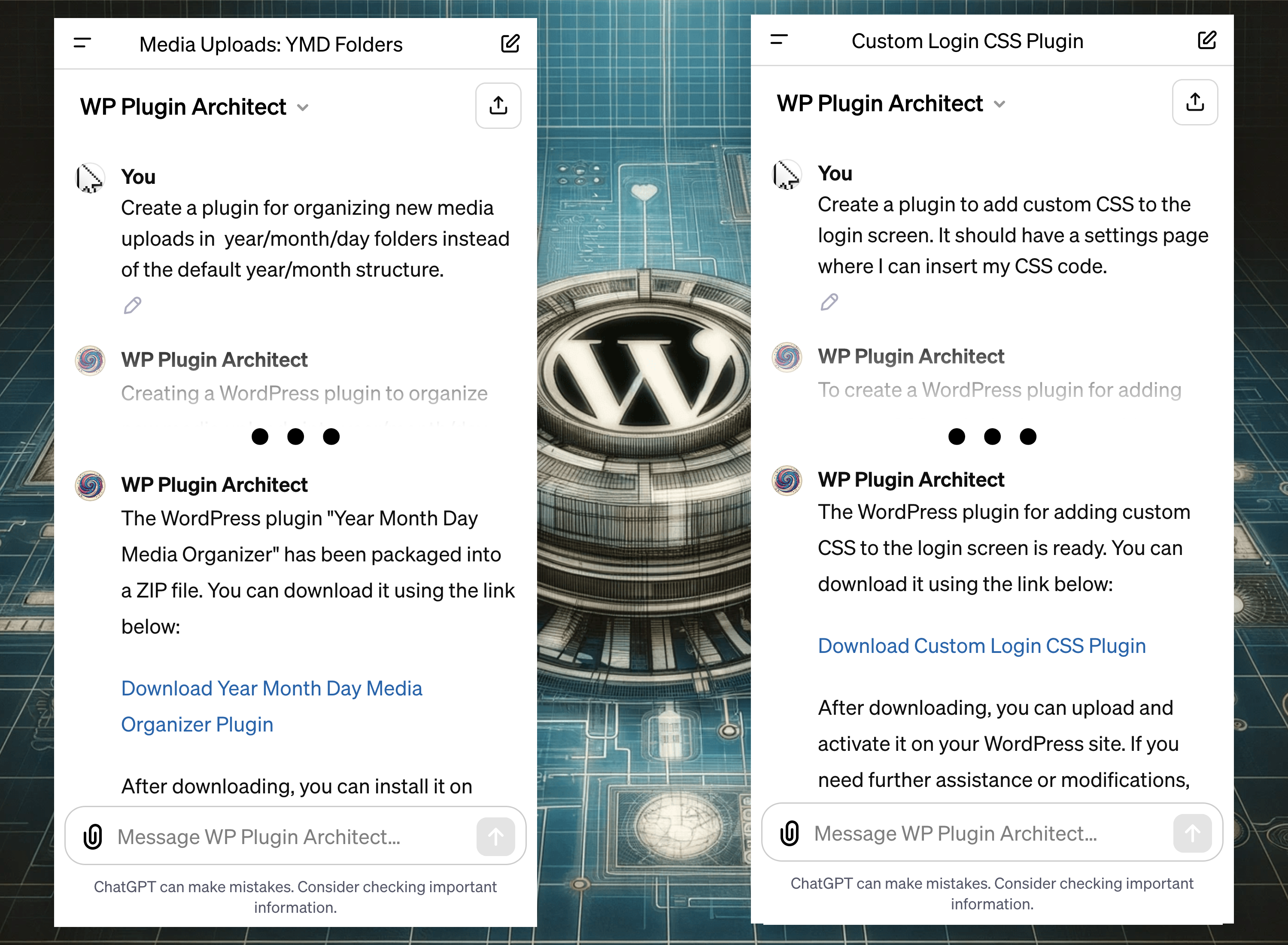In the ever-evolving world of WordPress, the creation and enhancement of plugins are essential for enriching website functionalities. As a WordPress developer with over ten years of experience, I’ve been privileged to contribute to impactful projects like Rank Math SEO, Content AI, MyThemeShop, and WP Review. Among these, Rank Math stands out, currently installed on more than 2 million sites according to WordPress.org statistics.
I’ve developed a custom GPT specifically tailored for WordPress plugin creation. This tool is designed with a keen focus on security and performance, representing a blend of my hands-on experience in the field and the latest advancements in AI technology.
In this article, I’ll share insights into this custom GPT’s capabilities, its application in real-world test projects, and the potential it holds to transform WordPress plugin development.
The Genesis of the WP Plugin Architect GPT
Previously, I found ChatGPT to be a valuable assistant in creating efficient plugins with a focus on simplicity and core functionality. The advent of Custom GPTs opened new avenues, allowing me to craft an even more advanced tool. The WP Plugin Architect custom GPT isn’t just a progression from its predecessors; it’s a leap forward in aiding plugin development. It’s designed to cater to developers of all levels, providing a robust foundation for creating straightforward, feature-specific plugins. Its strength lies in its ability to generate plugins that excel in executing one or a few key features, making it an ideal starting point for developers to build upon and extend.
Creating plugins in WordPress can be complex, with security and performance being crucial. This complexity often poses a significant challenge, especially for those new to the field or managing multiple projects simultaneously. My motivation behind this custom GPT was to alleviate these challenges, providing a streamlined, secure, and efficient approach to plugin development.
This tool is designed to serve as a reliable starting point, offering a solid base of code that adheres to WordPress’s best practices. Developers can then focus on enhancing and customizing this base, tailoring the plugins to their specific needs or the unique requirements of their projects. The goal is to empower developers at all levels to realize their creative visions, fostering a space for innovation and growth within the WordPress community.
Capabilities and Limitations of the WP Plugin Architect GPT
It’s important to understand both the capabilities and the boundaries of the GPT. This tool was designed with a specific vision in mind: to streamline the development of plugins that provide fundamental functionality to a WordPress site.
Capabilities:
- Simplicity and Efficiency: The GPT excels at generating plugins that are straightforward yet effective. These plugins can perform a range of essential functions, from enhancing website security to improving user interface elements.
- Feature-Specific Focus: It is adept at creating plugins that concentrate on one or a few key features.
- Foundation for Further Development: For more seasoned developers, these plugins serve as a solid foundation. They can be used as a starting point for more elaborate projects, saving valuable time in the initial stages of development.
Limitations:
- Restriction on Complexity: While the GPT is efficient at creating basic to intermediate level plugins, it is not designed to handle the creation of highly complex plugins. The intricacy involved in developing multifaceted plugins, which may require advanced coding skills and extensive WordPress knowledge, falls beyond its current scope.
- Scope of Creativity: The GPT follows a structured approach to plugin development, which means there are limits to the level of customization and creativity it can offer. This is an area where human intervention is still paramount.
- Mistakes: The GPT cannot run and test the plugin, and it makes mistakes. Sometimes, it can fix these mistakes when you ask it to, other times you’re left on your own. It cannot yet match the intuitive understanding and adaptive creativity of a seasoned WordPress developer.
This custom GPT stands as a powerful tool for creating basic and intermediate plugins, significantly aiding developers in bringing their ideas to fruition more efficiently.
Test Projects: Bridging AI with Human Expertise
In assessing the practicality and efficiency of the custom GPT for WordPress plugin development, several test projects were undertaken. These projects were essential in integrating AI capabilities with developer expertise to evaluate the tool’s effectiveness in a real-world setting.
Development Approach:
- AI-Driven Initial Development: In each project, approximately 90% of the foundational code and structure was generated by the GPT. This process involved the AI creating the basic framework and essential features of the plugins.
- Human Input and Refinement: The final 10% of the development process required human intervention. This step focused on reviewing and refining the AI-generated code, ensuring adherence to WordPress standards, and adding detailed functionalities that the AI could not accomplish.
Impact on Development Speed:
- Increased Coding Efficiency: The use of the GPT significantly reduced the time required to establish the basic code structure of the plugins, making the initial development phase more efficient.
- Shift in Focus to Enhancement: With the AI handling the primary coding, more time was available for enhancing and optimizing the plugins. This shift from creation to refinement helped streamline the overall development process.
- Iterative Learning: Each project contributed to the GPT’s learning, leading to continuous improvements in its output and further expediting future development processes.
These test projects highlighted the GPT’s capability to handle the initial stages of plugin development effectively, while also underscoring the necessity of human oversight for advanced refinement and customization.
Showcase of Test Plugins
The development of test plugins using the custom GPT provided valuable insights into the tool’s capabilities and areas for improvement. Here’s a look at four plugins developed and the specific challenges encountered during their creation:
Maintenance Mode Redirect
- Functionality: This plugin redirects all non-logged-in users to a specified page when activated, while allowing access to wp-admin and wp-login.
- Challenge Encountered: Initially, the GPT generated code resulted in an infinite loop error. Upon querying the AI about this issue, it provided a revised version that rectified the problem.
- Repository: Maintenance Mode Redirect on GitHub
WP Simple Newsletter Subscription
- Functionality: It collects names and emails for newsletter subscriptions, storing the data in a custom database table.
- Challenges Encountered: The GPT couldn’t provide a zip file due to a time constraint, leading to the files being requested individually.
- Repository: WP Simple Newsletter Subscription on GitHub
Custom CSS Per Page
- Functionality: This plugin allows users to add custom CSS to specific pages directly from the post editor or through the Quick Edit feature.
- Challenge Encountered: The AI included some unnecessary JavaScript code, which was subsequently removed during the refinement process.
- Repository: Custom CSS Per Page on GitHub
WP REST API Key Authentication
- Functionality: A straightforward plugin that adds a new authentication method to the WordPress REST API.
- Repository: WP REST API Key Authentication on GitHub
Each of these plugins demonstrates the GPT’s ability to handle core plugin development tasks while also highlighting the essential role of human expertise in troubleshooting and finalizing the development process.
Refining the GPT: A Continuous Improvement Process
The iterative development and refinement of this GPT exemplify the continuous improvement process integral to technological evolution. Each test project not only served as a proving ground for the GPT’s capabilities but also as a crucible for its enhancement. My role in this process was akin to that of a craftsman, carefully honing the tool with each iteration.
Specific issues encountered during the development of the test plugins, such as coding inefficiencies and minor errors, provided invaluable feedback. This feedback was directly incorporated into the GPT, resulting in successive versions that were more adept at handling the nuances of WordPress plugin development. This cycle of development, feedback, and improvement is a testament to the potential of AI in complementing human expertise in software development.
Conclusion
The integration of AI in WordPress plugin development, as demonstrated by this custom GPT, marks a significant milestone in the field. The blend of AI-driven efficiency and human creative prowess heralds a new era of plugin development, one where complexities are simplified and innovation is accelerated.
I encourage WordPress enthusiasts and developers to delve into the capabilities of this GPT. Experiment with the sample plugins, share your thoughts, and think about how this tool can be utilized in your own projects. Your feedback and experiences are crucial as we collectively navigate this path of progress and enhancement. Let’s utilize AI’s potential to craft WordPress plugins that improve the online experience for everyone.

